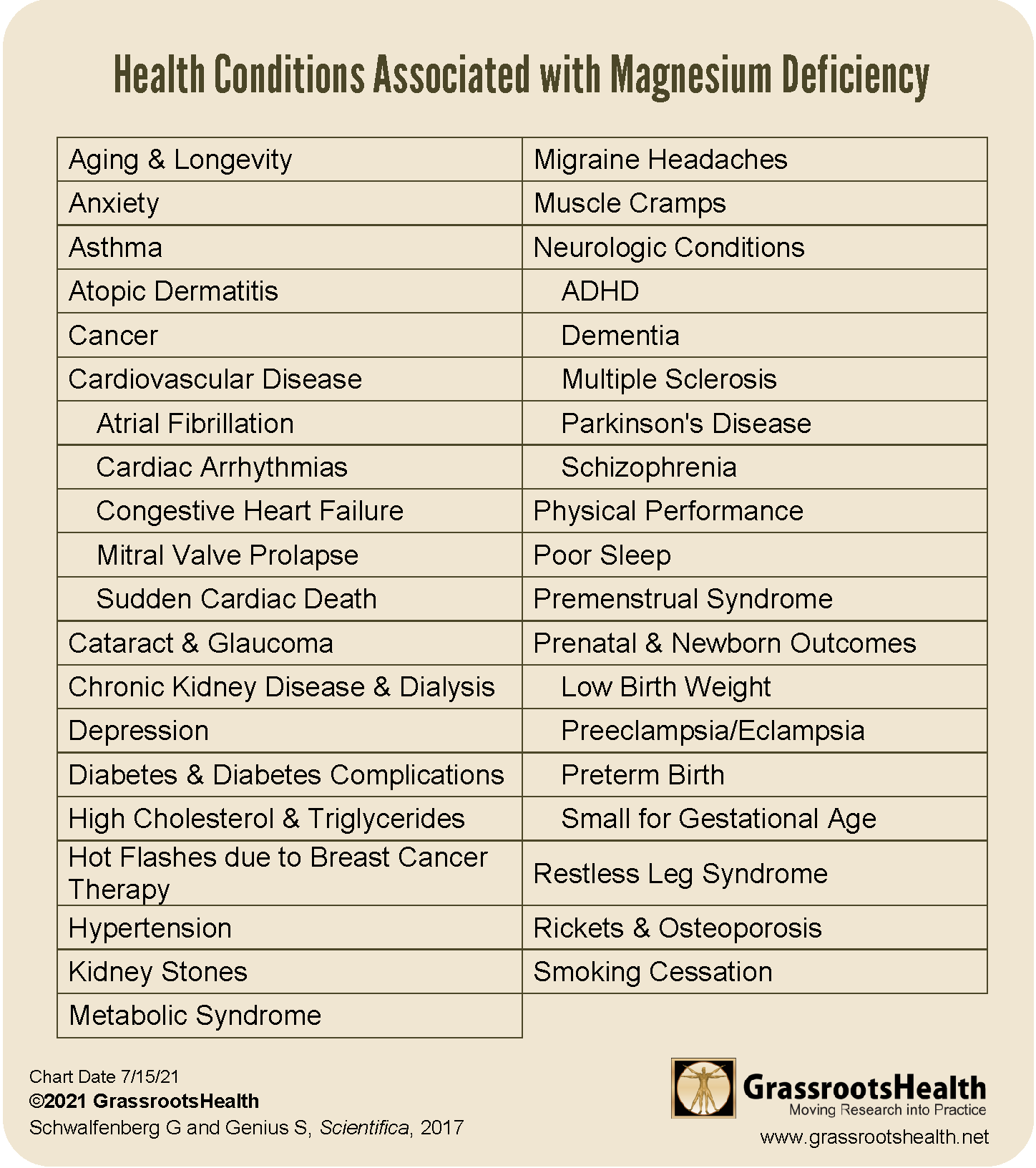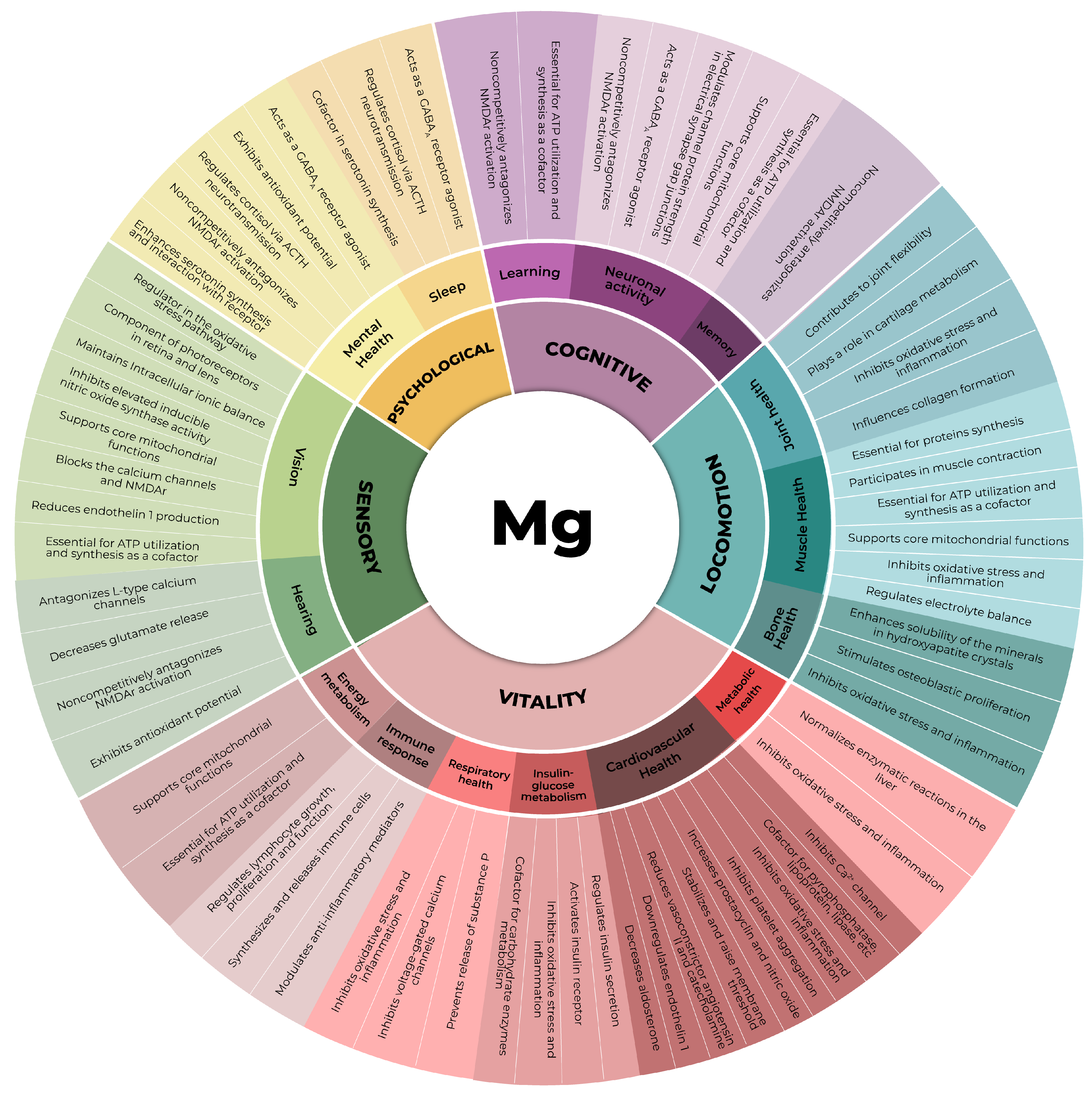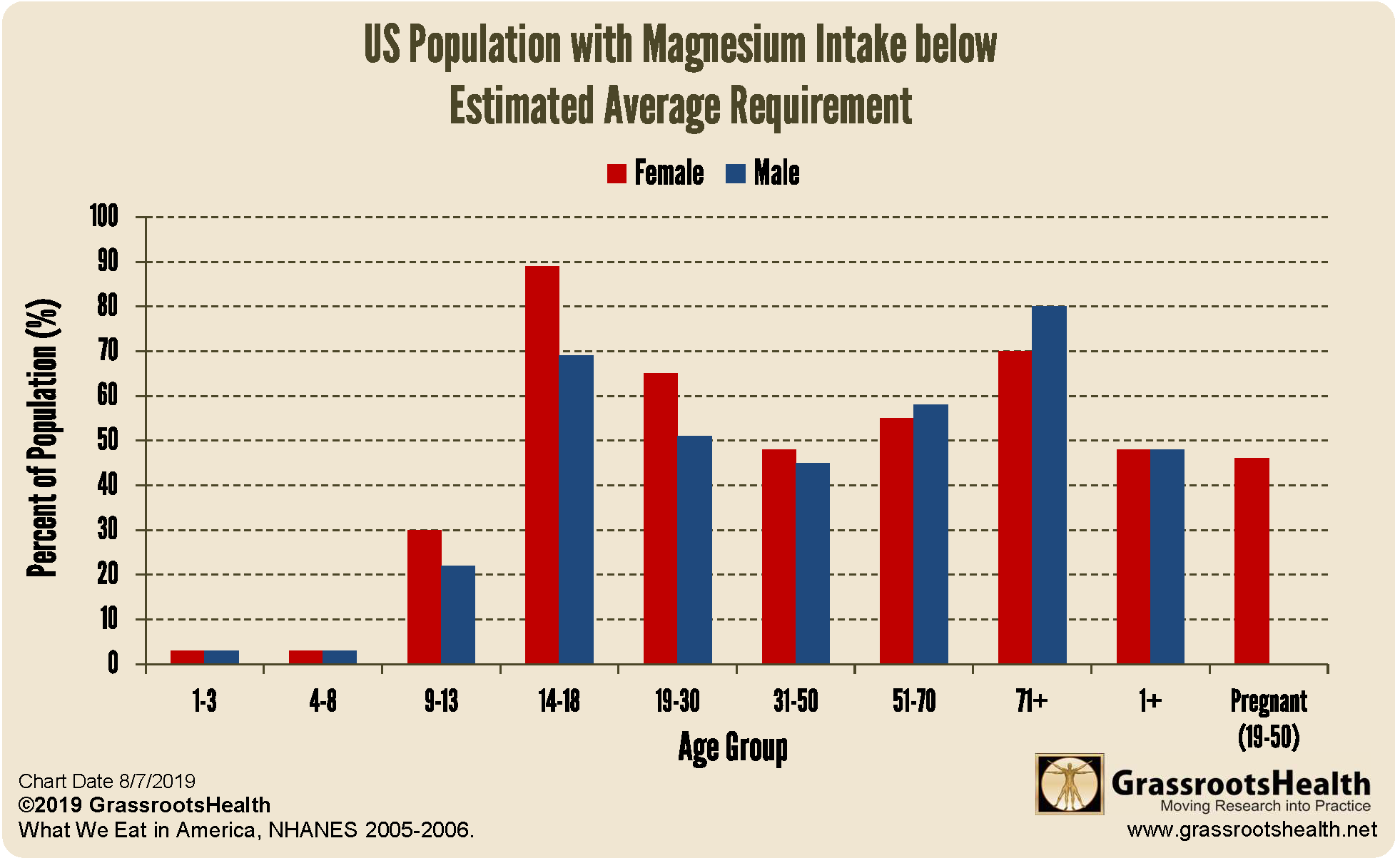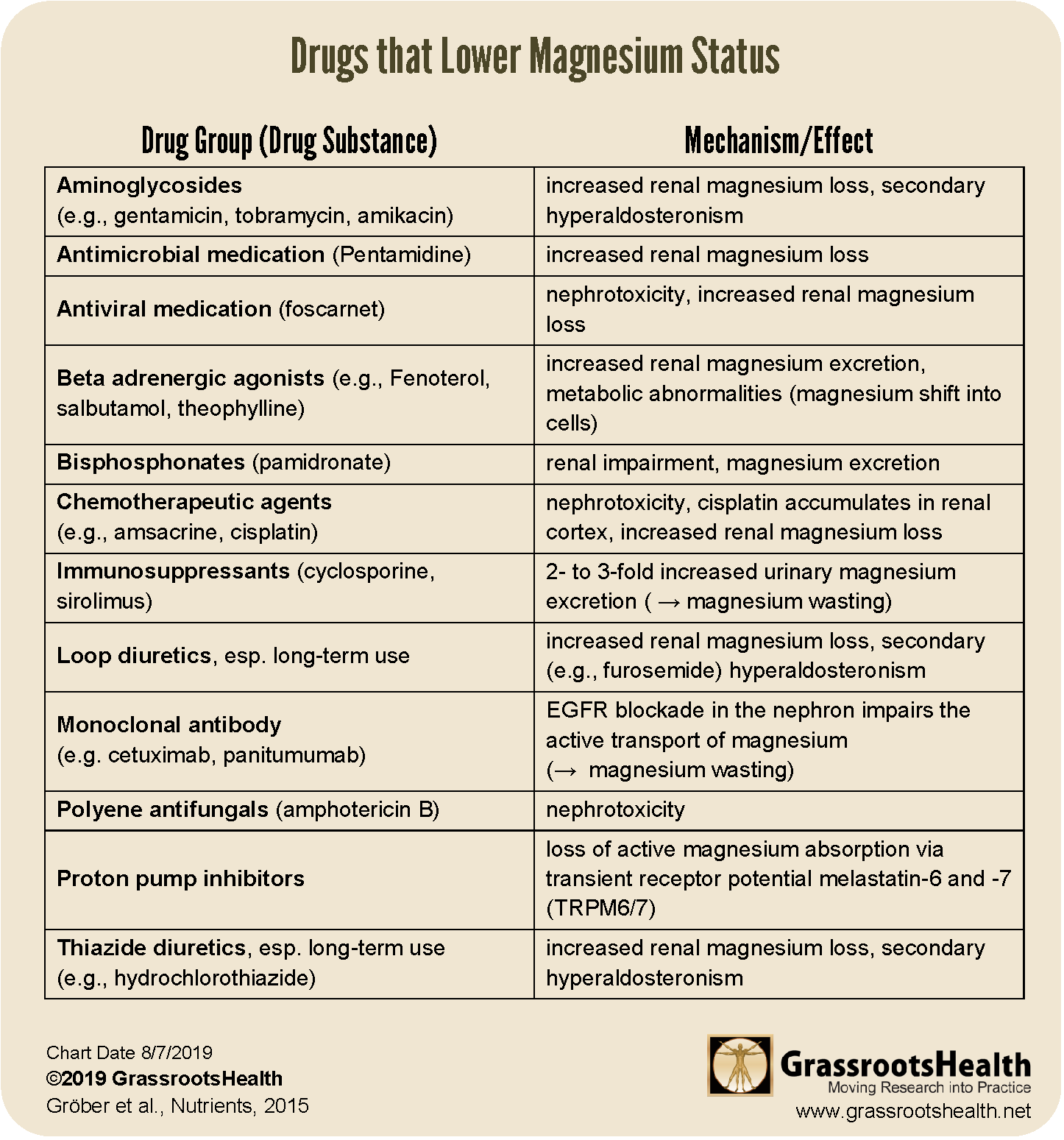Published on January 23, 2025
Nearly half to two-thirds of the US population are at risk of ongoing magnesium deficiency, which can lead to a variety of health complaints
Key Points
- Magnesium must be consumed regularly in order to prevent deficiency, which can result in symptoms such as loss of appetite, nausea, vomiting, fatigue, and weakness; when deficiency becomes more severe, it can result in more severe symptoms and the onset of several diseases
- According to an NHANES survey, nearly half of all individuals 1 year and older and more than two thirds of teenagers (ages 14-18) and elderly adults (ages 71 and over) have inadequate magnesium intakes
- Highlighted below are 7 factors that contribute to an increased risk of being magnesium deficient
Magnesium is an essential mineral needed for hundreds of bodily functions. Magnesium must be consumed regularly in order to prevent deficiency, which can result in symptoms such as loss of appetite, nausea, vomiting, fatigue, and weakness. When deficiency becomes more severe, it may result in symptoms such as numbness, tingling, muscle contractions and cramps, seizures, personality changes, abnormal heart rhythms, and coronary spasms. The chart below from this previous post presents a detailed summary of health conditions that low magnesium intake and levels may contribute to.
Significant Roles of Magnesium
Magnesium deficiency can affect many different processes within the body. A review published by Souza et al. titled The Integral Role of Magnesium in Muscle Integrity and Aging: A Comprehensive Review lists in detail many of the direct ways that magnesium is utilized to produce specific effects in key areas of our health and wellbeing. The color wheel below breaks these pivotal roles of magnesium down into the following categories:
- Learning
- Neuronal activity
- Memory
Locomotion
- Joint health
- Muscle health
- Bone health
Vitality
- Metabolic health
- Cardiovascular health
- Insulin-glucose metabolism
- Respiratory health
- Immune response
- Energy metabolism
Sensory
- Hearing
- Vision
Psychological
- Mental health
- Sleep
Click the image to enlarge the color wheel to see the specific roles of magnesium, download and print a PDF, or read the full paper here.
Half to Two-Thirds of the US Population at Risk of Magnesium Deficiency
There has been an estimated decline of magnesium intake in the United States over the last 100 years, from approximately 500 mg/day to 175-225 mg/day. The next chart illustrates the findings from a National Health and Nutrition Examination Survey (NHANES) survey, based on the comparison of magnesium intake from food and water to the Estimated Average Requirement (EAR) of magnesium. The EAR is the estimated amount of a nutrient’s daily intake needed for half of the healthy population to meet their daily requirements, broken down by age and gender – similar to the RDA, although the amounts referred to are lower. Nearly half of all individuals 1 year and older and more than two thirds of teenagers (ages 14-18) and elderly adults (ages 71 and over) had inadequate magnesium intakes when compared to the EAR.
Why You May be Deficient: 7 Causes of Magnesium Deficiency
This video by HealthRX presents an excellent review of factors that increase a person’s risk of being magnesium deficient.
Video Summary
The following factors contribute to a higher risk of magnesium deficiency:
1. Dietary factors
- people who don’t eat enough magnesium rich foods
- foods previously high in magnesium are no longer rich in magnesium due to farming or processing
- high intake of saturated fats can cause decreased absorption of magnesium in the intestines
- high sugar intake can cause an excessive amount of magnesium to be excreted by the kidneys, leads to less magnesium retention in the body
- carbonated drinks (especially those with phosphorus) can reduce the absorption of magnesium
2. Age – Older adults are at higher risk
- less magnesium absorption in the gut with age
- increased excretion of magnesium in the urine with age
- a higher likelihood of chronic diseases with age also increases the chance of taking a medication that can interfere with magnesium absorption and utilization (see below)
3. Individuals with Type 2 Diabetes
- higher concentrations of sugar in the blood increase excretion of magnesium in urine
4. Those taking certain medications
- stomach acid reducers (such as Nexium, Prevacid, Prilosec, Pepcid, Tums)
- See the table below for a more extensive list of medications that can cause magnesium loss and deficiency
5. People with excessive or uncontrolled stress
- stress hormones eat up magnesium and can deplete magnesium stores
- stress affects absorption in the gut, leading to less magnesium being absorbed
6. Alcohol dependence
- alcohol interferes with magnesium absorption
- increased alcohol consumption often leads to consuming less nutritious, magnesium rich foods
7. Gastrointestinal diseases
- Malabsorption due to gastrointestinal disorders, such as Chrohn’s disease, ulcerative colitis, celiac disease, Whipple’s disease, and others involving chronic diarrhea, can also cause decreased absorption and lead to deficiency
The form or type of magnesium ingested also affects absorption, with magnesium oxide and magnesium carbonate having a lower absorption compared to other forms, such as magnesium glycinate and magnesium citrate. The level of certain hormones, such as parathyroid hormone and calcitriol (the active form of vitamin D), genetics, and gastro-intestinal problems can also affect magnesium absorption.
Take a look at your magnesium levels to see where you are!
Are you getting adequate magnesium on a regular basis?
One way to tell if you are getting enough magnesium is by measuring your whole blood magnesium status. This test is included in the Elements Panel offered by GrassrootsHealth, and it includes a vitamin D test along with essential elements magnesium, selenium, zinc, copper, and toxic elements cadmium, lead, and mercury.
Measure Your Levels Today and Save 15% with Code NEWYEAR25!
Other nutrients are essential to our health as well, including vitamin D, magnesium, selenium, and omega-3s; measuring these can help determine if more of these nutrients might be needed to provide the greatest risk reduction for disease and improve health outcomes.
For example, the Immune Boost Panel Test Kit includes each of these measurements:
- Vitamin D
- Omega-3 Index
- Magnesium PLUS Elements
- hsCRP as a marker of inflammation
Having and maintaining healthy vitamin D levels and other nutrient levels can help improve your health now and for the future. Enroll and test your levels today, learn what steps to take to improve your status of vitamin D (see below) and other nutrients and blood markers, and take action! By enrolling in the GrassrootsHealth projects, you are not only contributing valuable information to everyone, you are also gaining knowledge about how you could improve your own health through measuring and tracking your nutrient status, and educating yourself on how to improve it.










